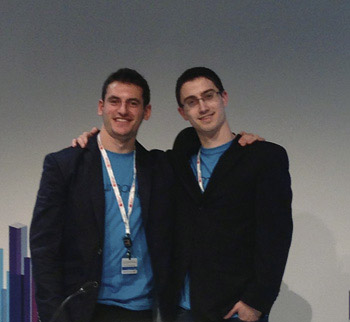Two Waterloo-based men are hoping their app will change the way people take care of their bodies.
Built through a partnership between Phil Jacobson and Garrett Gottlieb, both 23 years old, fitness app PumpUp has been reaching people all over the globe.
With more than 100,000 downloads, the app helps build personalized workout routines. For example, someone with just 15 minutes at home with no equipment could log on and get a routine laid out for them. The same goes for someone with hours to spare at a gym, surrounded by weights and machines.
“We show them what to do and how to do it, and they can share their progress with broader community,” Jacobson said.
Gottlieb said it all started when he was in high school, getting into the routine of doing a daily workout and learning from his father.
When he got to university, he continued the habit, but by the time he was in his third year, he felt that his workouts were becoming stale.
“I tried searching for apps on my phone to make me a cool workout, but it was just workout libraries or exercise lists, so I decided to build it myself,” he said.
After working at three startups and then at BlackBerry (then Research In Motion) as part of his computer science studies at the University of Waterloo, he realized he didn’t want to work for a big company.
“The responsibility was very low, and there wasn’t a whole lot of creativity involved. It didn’t feel like I had as much artistic freedom,” he said.
He took some time to develop the app as part of the University of Waterloo enterprise co-op program, where he won $4,000.
That’s when his friend and Jewish fraternity brother, Jacobson, joined the team, bringing in the skills he learned as a business student at Wilfrid Laurier University.
“I developed the prototype and vision, but it was a matter of executing that vision,” Gottlieb said.
Once they won a $25,000 prize in the VeloCity Venture Fund, a competition at the University of Waterloo for innovative tech startups, they knew they had something worthwhile.
But it wasn’t long before the pair decided that they needed to go bigger. They tried out for CBC’s Dragons’ Den and although they were turned away, a month later, they were invited onto the show. It aired earlier this month.
So they walked into the den with a phone attached to a large monitor to demonstrate the app, as well as a hugely muscular bodybuilder. That was the producer’s idea, Jacobson told Waterloo-based tech hub Communitech, explaining that the app targets beginners more than experts, so he wasn’t thrilled with the idea, but the producer insisted.
On the show, the pair asked the “dragons” for $100,000 in exchange for 10 per cent of the business. Unfortunately, at that time – in April – they didn’t have the user numbers to convince the investors their business was worth the investment.
At the time, they’d had only 12,000 downloads, with only about a third of them active, and a handful of people opting for the paid premium features, which so far is just a voice coaching option.
The fact that the pair were focusing on increasing their number of users rather than figuring out how to encourage those users to pay for the app dissuaded the dragons from making a deal.
David Chilton, author of successful financial planning book franchise The Wealthy Barber, did offer to invest in PumpUp, but he offered $100,000 for 20 per cent equity, as well as 25 per cent royalty.
“We believe all cash, whether by investment or revenue, needs to go back into the business,” Jacobson said. “That would have held it back.”
He said the fact that PumpUp has since then increased its subscribers by 1,000 per cent shows that it was a smart decision, and he doesn’t regret turning down the offer.
However, the company still isn’t focusing on monetizing the app – something that Venture Communications CEO Arlene Dickinson said is a problem with startups. “They’re so full of, ‘We know everything and we’ve got the best thing since sliced bread,’ and it’s ridiculous,” she said after the PumpUp team left the den.
Fellow dragon Bruce Croxon, CEO of LavaLife, reminded her that if these kinds of ideas catch on, they can scale very quickly.
That’s what Jacobson and Gottlieb are hoping will happen with PumpUp.
“We’re continuing to involve the product and grow the user base… We’ll focus on revenue in the future. Right now, we’re focused on growth, and we’re seeing hypergrowth,” Jacobson said, adding that the growth includes adding two more staff members.
He credits his success partially to his experience in the Jewish fraternity Alpha Epsilon Pi. In his last year of university, he was president of the Waterloo chapter, and he said the role helped him learn how to manage an organization.
“It’s a platform for you to explore and learn,” he said, adding that he would encourage any male Jewish university students to join. “If you leverage it from an exploring and learning perspective, you get so much out of it.”
Both Gottlieb and Jacobson are hoping to continue drawing on that and other experiences to help the company continue to grow.
They are optimistic. “A year from now, we’ll have millions of users using the product across the world,” Jacobson said.
For more information, visit pumpup.co.
